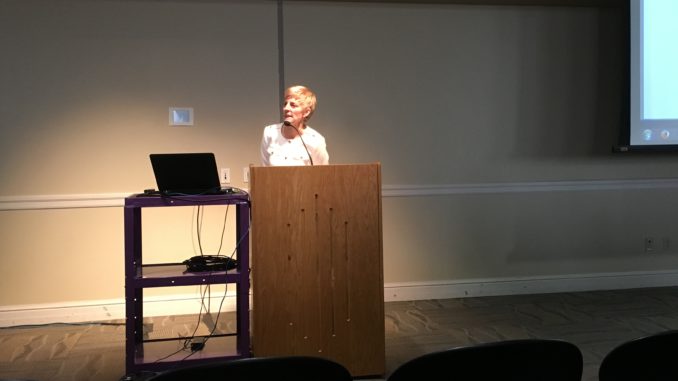
Before Truman State University President Sue Thomas even finished her State of the University address last week, people were outraged. As I slipped out of the third row while Thomas was wrapping up a few minutes before 4 p.m., I checked my phone. My Twitter and Facebook feeds were loaded with 280-character versions of the points I would later struggle to appropriately sum up in a 1,200-word article for The Index. Not long after, the comments started — and they didn’t stop for the next few days.
Posts about the address racked up dozens of shares and retweets, as well as paragraphs-long analyses on Facebook. This surprised me because I could count fewer than 10 students at the address who were not part of Student Government. I spent much of Tuesday evening typing up my article — which is probably the most comprehensive analysis of the speech available, sourced directly from my notes and those of senior assistant editor Johanna Burns. It was disheartening to know that long before those words hit newspaper stands on Thursday, many people would have already made up their minds about the address without being there or knowing the full scope of topics discussed.
One comment in particular that gained a lot of traction on social media was when Thomas pointed out that more than half of Truman students come from households with incomes of more than $110,000 per year. This statistic itself is, honestly, sort of meaningless. I didn’t even find it important enough to put in my story. Yes, that figure is a little surprising given we are a fairly affordable school — although solidly middle-of-the-pack as far as Missouri public schools go, according to state data — but it’s the truth.
The greater point of that section of the speech was about how Truman would like to use its scholarship funds more efficiently. The Index has run two stories on that process — including one last week — and it’s been clear from the beginning that Truman does not want to discourage any potential students from attending. Additionally, any plans to change scholarship distribution will not include changes to current students’ scholarships. If anything, my personal interpretation of that statistic is that Truman can afford to give more financial aid to students who do not fit that top category.
This was a 30-second talking point from a speech that lasted more than an hour. Most of the speech wasn’t even pertinent to student interests. Instead it spoke to faculty and staff about how the University plans to get through this budget crunch. Except for the surcharge during spring 2017 — which there has been no talk of repeating this semester — students have been largely unaffected by budget cuts. Through institutional excellence committees, the Truman community has done a lot of soul searching, and we have determined and preserved the most important parts of this school.
While academic departments were saved from cuts, other departments have not been so lucky. Maintenance and repair and Pickler Memorial Library, to name a few, have been left with large gaps to fill. That being said, overall, Truman has done a good job weathering the storm. However, there’s another storm coming, and we all have to be prepared for what’s going to happen. As students, our voices will not be worth much if we make assumptions based on tweets and sound bites. If we attend as many meetings as we can, read as many articles as we can and educate ourselves about the situation, our input will count for so much more.
I have personally spoken to Thomas, Janet Gooch, executive vice president for academic affairs and provost, Dave Rector, vice president for administration, finance and planning, and Gina Morin, vice president for enrollment management, and I assure you they are all as upset about Truman losing funding as students are. The Truman community is a great one — we have the resilience to get through this. If we, as students, turn our backs on the administration and do not trust them to do the best for this institution that we and they all love, we’re all going to be unhappy.
I’m not trying to tell you to blindly follow the powers-that-be or that they can do no wrong. Ask any of my friends — I will be the first to call out problems I see with authority, especially institutional hierarchies. None of us students will agree with every decision the administration makes. However, I do think we have allies who can really make a difference. Throwing away those partnerships by tossing around blame based on unsubstantiated information on the Internet is not how we will move forward and survive as a University and a community.
